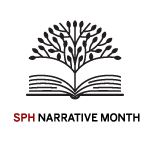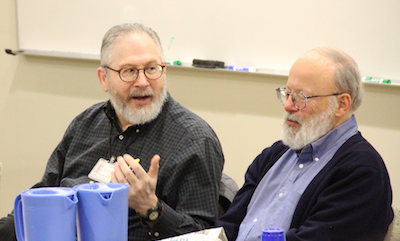Long-Running Seminar Brings Literature into Health Field.

If his medical training had been better, the English Romantic poet John Keats “would have made a wonderful clinician,” Mary Annas said at the final meeting of the Spring 2017 Literature and Medicine Luncheon Seminar on February 15.
Annas, a lecturer in English at Northeastern University, was leading a discussion of Keats’ poem “Autumn,” as well as his concept of negative capability—the ability to sit with uncertainty and mystery—with her husband, George Annas, Michael Grodin, and about 20 participants.
 Grodin and George Annas, both SPH professors in the Center of Health Law, Ethics & Human Rights with appointments at the School of Medicine and on the Charles River Campus, have led the seminar off and on for 33 years, since after a formal seminar series was discontinued in the first year medical school curriculum. (Mary Annas, a poet, joined them six years ago.)
Grodin and George Annas, both SPH professors in the Center of Health Law, Ethics & Human Rights with appointments at the School of Medicine and on the Charles River Campus, have led the seminar off and on for 33 years, since after a formal seminar series was discontinued in the first year medical school curriculum. (Mary Annas, a poet, joined them six years ago.)

“Once taken out of the formal curriculum,” George Annas says, “we thought it was important to continue looking at literature and medicine, so we did, and it became a non-credit, non-required seminar.”
Since then, the lunchtime seminar has consistently drawn students, faculty, and staff from across the Medical Campus. In that time, the material has ranged from poetry and short fiction to novels, nonfiction, theatre, comedy, and even visual art. “Part of it is about seeing, what this can bring to your observational skills, to seeing versus interpreting,” Grodin says.
George Annas says one of the main goals of the seminar has always been to humanize medicine by concentrating on the person and their story, rather than just the disease. Since the seminar began, he says human dignity and recognizing the patient’s needs and rights has been increasingly recognized as critical to effective clinical care.
Over the years the most popular works concentrated on death, Annas says, including Leo Tolstoy’s The Death of Ivan Illych, Gaetano Donizetti’s Imelda de’ Lambertazzi, Philip Larkin’s “Aubade,” and poems by Sylvia Plath. He says he sees dying and end-of-life care as a major public health issue. “It’s something we will all experience, and we can do so much better in preventing the often horrible aspects of dying, including isolation, pain, and being treated as if our stories no longer matter.”
The discussion of Keats and sitting with uncertainty delved into caring for patients when knowing everything about their condition is impossible, being with those who are dying, and approaching issues large and small with an open mind. Earlier in this spring’s series, the seminars have covered aging, mental illness, homelessness, research, and even using humor to cope with cancer.